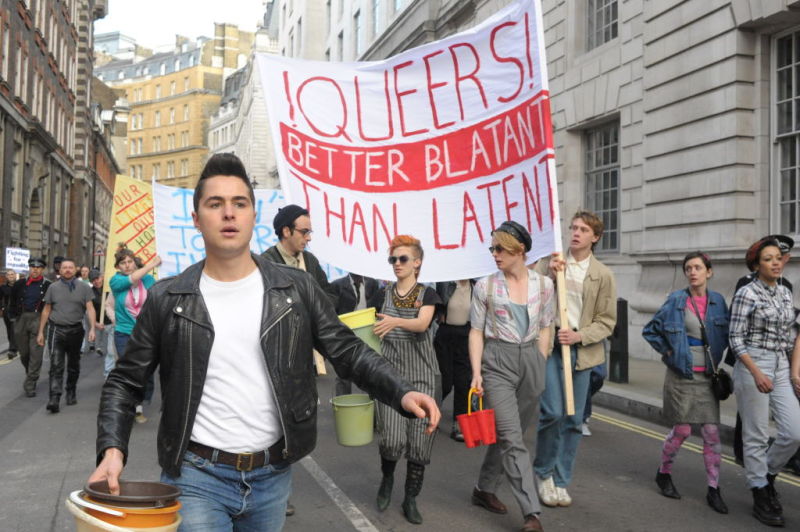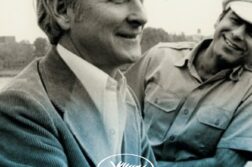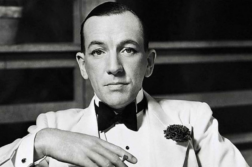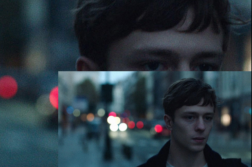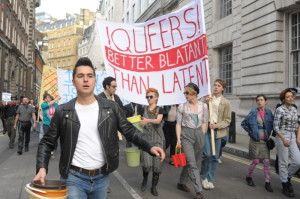 EARLY ON IN PRIDE, after the leader of a ragtag group of London gay activists has proposed that they raise money for the striking coal miners—the year is 1984—one member protests: “Yeah, like they’ve done so much for us.” In the end, persuaded by their charismatic leader Mark, they decide to go ahead with the plan. A new name for the group is chosen—LGSM (Lesbians and Gays Support the Miners); donation buckets are fashioned; and the eight or so members start soliciting contributions on the street. All that’s needed now is a random coal-mining town to serve as the recipient of their largesse, so a phone book is used to select the lucky winner: a town named Onllwyn in the south of Wales.
EARLY ON IN PRIDE, after the leader of a ragtag group of London gay activists has proposed that they raise money for the striking coal miners—the year is 1984—one member protests: “Yeah, like they’ve done so much for us.” In the end, persuaded by their charismatic leader Mark, they decide to go ahead with the plan. A new name for the group is chosen—LGSM (Lesbians and Gays Support the Miners); donation buckets are fashioned; and the eight or so members start soliciting contributions on the street. All that’s needed now is a random coal-mining town to serve as the recipient of their largesse, so a phone book is used to select the lucky winner: a town named Onllwyn in the south of Wales.
The film is about what happens when this group of urban gay people descends upon a socially conservative town in the Welsh highlands at the height of the coal-miners’ strike during the Thatcher era. The fact that these outsiders have come bearing gifts sets up a moral dilemma for the miners and their families, who must decide whether to accept these freaks for who they are or send them packing along with their bounty. Inevitably, the townsfolk are divided, with some embracing the outsiders almost immediately and others needing a bit more time and prodding—the promise of dance lessons softens up some of the men. And of course there have to be a few spoilsports who don’t want their stinking money and set out to sabotage the campaign in any way they can.
Based on actual events from the miners’ strike of 1984-85, Pride offers a mostly lighthearted interlude set against the backdrop of a dire time for British workers as the Thatcher government sought to break the power of the labor unions, especially that of the coal miners, whose strike lasted for almost a year before the miners, broken and demoralized, returned to work. In this respect Pride belongs to a genre of film that mingles the personal and the political by showing what happens when individual lives become caught up in events outside of their control. To compare this film to Casablanca or Doctor Zhivago might be a reach, but it does provide a vivid glimpse into the lives of a few people who lived through what was a wrenching period for the UK as a whole.
At the personal level, Pride spotlights a few individuals in both camps—members of LGSM and the people of Onllwyn—and shows how they were transformed in this whirl of events. As the movie begins we meet Joe, a cute student of twenty who’s just coming out and isn’t quite ready to tell his stern parents, much less the world; all that will change. Soon we meet Gethin, the owner of the bookshop where the group congregates and a man with another kind of secret: his Welsh roots and his estrangement from his mother, which these events bring to a head. Among the many people we meet in the town, the story settles on a respected older gentleman named Cliff (played by veteran actor Bill Nighy), who becomes a principal defender of the gay group and may just harbor a secret of his own.
On the political side, apart from its somewhat heavy-handed pro-union and anti-Thatcher biases, the film is a case study in the kind of coalition-building that’s often discussed as a goal of political action groups but rarely enacted in practice. The rejoinder cited at the top—“What have you done for us lately?” in effect—may resonate for gay activists who’ve ever tried to build bridges to other civil rights movements only to be rebuffed. For that matter, one can easily imagine the initiative depicted in Pride falling flat on its face—or even ending in bloodshed, a possibility that is in fact explored in the movie. Perhaps the reason it worked so well is precisely because what the London group did was so unexpected, so exceptional, that the townspeople were simply too astonished to protest—or too desperate to turn them down. It wasn’t bribery because the gay group didn’t ask for anything in return, which is what the miners found so perplexing.
In any case, if the events depicted in the film are true to life, as claimed, the actions of LGSM may have played a role in shifting the coal miners union’s position on gay rights, which in turn nudged the whole trade union movement in the UK toward official acceptance of GLBT equality. No one could have predicted that things would work out that way, least of all the handful of activists who threw a dart into the air. At a time when the GLBT rights movement has settled into an almost bureaucratic routine, the message is clear: do something unexpected, even a little crazy, for a change; you never know what might come of it.
Pride
Directed by Matthew Warchus
Playing now at selected theaters in the US


